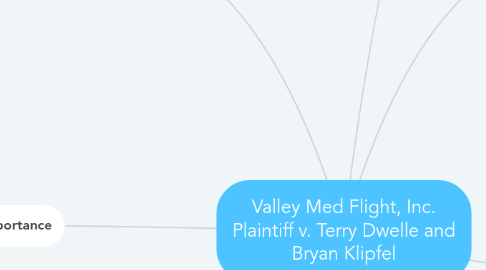
1. Influence
1.1. Now that the law is not enforceable Insurance Providers will need to find other alternatives to determine and estimate cost of air ambulance.
1.2. Healthcare providers may need to lean into the Affordable Care Act more in efforts to influence a change at the federal level.
2. Importance
2.1. This law impacts if the North Dakota law is enforceable and who insurance providers would prefer to do business with based on cost and service levels.
3. Impact
3.1. Hillsborough County, Fla v. Automated Med Labs, Inc.
3.1.1. Action was brought challenging constitutionality of local ordinances governing collection of blood plasma from paid donors.
3.1.1.1. The US District Court from the Middle District of Florida upheld ordinances and appeal was taken.
3.1.1.1.1. The Court of Appeals for the 11 Circuit affirmed in part and reversed in part County appealed.
3.2. Air Transport Association of America, Inc. (Plaintiff) v. Andrew Cuomo, in his official capacity as Attorney General of the State of New York, Mindy Bockstein, in her official capacity as Chairperson and Executive Director of the New York State Consumer Protection Board (Defendants)
3.2.1. Airline industry association sued State of NY and State Officials, seeking determination that NY Passenger Bill of Rights (PBR) requiring airlines to furnish fresh air, sanitation facilities, water, and food to passengers on flights delayed on ground for more than three hours was preempted by federal law.
3.2.1.1. The US District Court for Northern District of NY granted summary judgement in favor of the defendants.
4. Facts
4.1. Parties
4.1.1. Valley Med Flight Inc. (Plaintiff)
4.1.2. Terry Dwelle, MD in his Official Office as State Health Officer of the North Dakota Department of Health, and Bryan Klipfel, his Official Capacity as Executive Director of the North Dakota Workforce Safety & Insurance, (Defendants).
4.2. What Happened?
4.2.1. Valley Med Flight, Inc brought action against North Dakota state officials, seeking declaratory and injunctive relief to prevent enforcement of two state statues and one state regulation, requiring such operators to become participating providers with certain North Dakota health insurance companies in order to be listed on "primary call list" and setting forth applicable fees schedule under state's workers' compensation system asserting that these laws were preempted by Airline Deregulation Act (ADA) and Emergency Medical Treatment and Active Labor Act (EMTALA).
5. Issue
5.1. Airline Deregulation Act (ADA) and Emergency Medical Treatment and Active Labor Act preempt North Dakota statue creating primary and secondary call lists.
6. Rule of Law
6.1. Conflicting or conforming laws or regulations
6.1.1. Supremacy Clause, via invocation of federal preemption principles, invalidates state laws that interfere with or are contrary to federal law.
6.1.1.1. Under the Supremacy Clause, federal law may supersede, or preempt state law in several different ways:
6.1.1.1.1. 1. Congress may expressly state that federal law preempts state law (express preemption);
6.2. Preemption in general
6.2.1. Under the Supremacy Clause, federal law may supersede, or preempt, state law in several different ways: 1) under express preemption, Congress may expressly state the federal law preempts state law; 2) under field preemption Congress intent to preempt state law may be inferred from its comprehensive regulation of an area of law or 3) under conflict preemption, state law may actually conflict with the federal law, i.e. where compliance with both federal law and state law is physical impossibility or where the state law stands as an obstacle to accomplishment and execution of the full purposes and objectives of Congress.
6.3. Workers' Compensation
6.3.1. North Dakota Workforce Safety & Insurance (WSI) which is the state agency charged with managing the state's workers' compensation system, is not an insurer as benefits are paid pursuant to state law rather than under any policy of insurance.
7. Analysis
7.1. Valley Med contends Section 23-27-04.10 of North Dakota Century Code is a clear attempt to regulate air ambulance service providers.
7.1.1. Valley Med further contends that because the law in question has a significant impact on the price, routes, and services of air ambulance service providers, the law is preempted by the ADA.
7.1.1.1. The impact of Section 23-27-04.1 on Valley Med's prices, routes, and services is clear and significant
7.1.1.1.1. Section 23-27-04.1 (1) mandates the creation of primary and secondary call lists.
7.1.2. Defendants Dwelle and Klifpel (collectively "State") contend Section 23-27-04.1 is not related to Valley Med's prices, routes, or services.
7.1.2.1. The argues that becoming a "participating provider" is simply a business decision made by air ambulance operators.
7.2. Whether the ADA Preempts
7.2.1. Valley Med contends that ADA preempts North Dakota Century Code 65-02-08 North Dakota Administrative Code 92-01-02-45.1 (22) and the related air ambulance feed schedule because these laws relate to the prices that air ambulance service providers may charge in North Dakota.
7.2.1.1. section 65-02-08 provide all fees on claims for medical and hospital goods and services provided under this title to an injured employee must be in accordance with schedules of fees adopted by the organization. This provision applies to medical services provided by air ambulance.
7.2.1.1.1. Valley Med contends these provisions collectively mandate the reimbursement rates for air ambulance services and impermissibly prohibit balance billing to the employer.
7.2.2. The defendant contends that WSI's fee schedule are part of its overall managed care program designed to effect the best medical solution for an injured employee in a cost-effective manner.
7.2.2.1. The State also admits these provisions apply to services provided by air ambulances. The State's only contention in support of the provisions is that the McCarran-Ferguson Act's reverse preemption clause saves and the related fee schedule from preemption because these provisions were enacted in order of regulated the business of insurance.
8. Conclusion
8.1. Courts ruled in favor of Valley Med
8.1.1. The courts determined that the ADA preempts the North Dakota Century Code and North Dakota Administrative Code and the related air ambulance fee schedule.
8.1.1.1. EMTALA argument was not addressed
8.1.1.1.1. The North Dakota Code Sections 23-27-04.1 and 65-02-08 are not enforceable.

